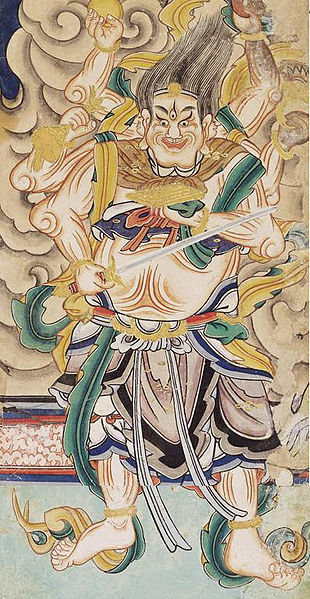Zhu Bajie (Chinese: 豬八戒; pinyin: Zhū Bājiè; Wade–Giles: Chu1 Pa1-chieh4), also named Zhu Wuneng (he has two Buddhist Dharma names, one, "Wuneng" (悟能) given to him by the bodhisattva, Guanyin, and one, "Bajie" (八戒) given to him by Tang Sanzang/Tripiṭaka), is one of the three helpers of the aforementioned-Tang Sanzang and a major character of the 16th century novel Journey to the West. Zhu means "swine" and Bajie means "eight precepts". Prior to his being recruited by the bodhisattva, Guanyin, Zhu Bajie went by "Zhu Gāngliè" (豬剛巤; literally "Strong-Maned Pig"). Buddhist scholars consider that both expressions are related to "Śīla pāramitā". In many English versions of the story, Zhu Bajie is called "Monk Pig", "Pig", "Piggy", or "Pigsy".
天篷元帥 (Tian Peng Yuan Shuai)
The golden statues at the Rua Yai City Pillar Shrine in Suphan Buri, Thailand
Zhu Bajie slaying demons with his rake
Caricature statues of Zhu Bajie & Sha Wujing on the streets of Lianyungang
Tang Sanzang is a Buddhist monk and pilgrim who is a central character in the 16th century novel Journey to the West by Wu Cheng'en. Tang Sanzang is based on the historical Tang dynasty monk Xuanzang.
Depiction of Tang Sanzang
The four heroes of Journey to the West, Tang Sanzang on the second from the left, riding on Yulong. Painted decoration in the Long Corridor at the Summer Palace in Beijing, China
The golden statues at the Rua Yai City Pillar Shrine in Suphan Buri, Thailand






